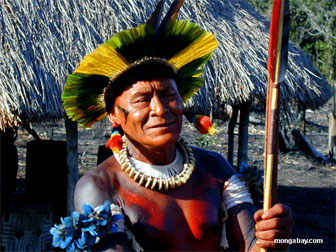Kayapo tribe gets trust fund for Amazon protection
mongabay.com
June 11, 2008
The government of the Brazilian state of Pará and Conservation International-Brasil (CI) have established a trust fund to support conservation and sustainable development initiatives by indigenous Kayapó groups in the Amazon rainforest. The fund will have an initial endowment of 10 million reals (US$6.2 million).
Research has shown that indigenous reserves in Brazil reduce the incidence of fires and deforestation relative to unprotected forest lands. The Kayapó Indigenous Lands are no exception, safeguarding large tracts of forest in a zone where logging and clearing for cattle pasture and industrial agriculture is rampant.
“The indigenous lands are essential to ensure conservation of the extraordinary socio-diversity of Pará state and they should be an integral part of the investment policy of any Amazonian state”, Valmir Ortega, Pará State Secretary of Environment, said in a statement.

Kayapo shaman in Brazil. Photo by Sue Wren |
“We hope to have the fund working fully by the end of the year,” he continued. “We will begin with the Kayapó Indigenous Lands, but our objective is, over time, also to create similar mechanisms for other indigenous lands, such as those located in the Northern Pará”
CI says the trust fund will provide ongoing support for infrastructure improvement, technical capacity building, territorial protection, and the establishment of sustainable enterprises across the 11 million hectares that make up the Kayapó Indigenous Lands.
Indian reserves make up 20.6 percent of the Brazilian Amazon.
Related
Indigenous people are key to rainforest conservation efforts says renowned ethnobotanist October 31, 2006
Integrated biodiversity and cultural conservation can be more effective than traditional protected areas while delivering health benefits to local populations says Dr. Mark J. Plotkin, president of the Amazon Conservation Team. Tropical rainforests house hundreds of thousands of species of plants, many of which hold promise for their compounds which can be used to ward off pests and fight human disease. No one understands the secrets of these plants better than indigenous shamans — medicine men and women — who have developed boundless knowledge of this library of flora for curing everything from foot rot to diabetes. But like the forests themselves, the knowledge of these botanical wizards is fast-disappearing due to deforestation and profound cultural transformation among younger generations. The combined loss of this knowledge and these forests irreplaceably impoverishes the world of cultural and biological diversity. Dr. Mark Plotkin is working to stop this fate by partnering with indigenous people to conserve biodiversity, health, and culture in South American rainforests. Plotkin, a renowned ethnobotanist and accomplished author (Tales of a Shaman’s Apprentice, Medicine Quest) who was named one of Time Magazine’s environmental “Heroes for the Planet,” has spent parts of the past 25 years living and working with shamans in Latin America. Through his experiences, Plotkin has concluded that conservation and the well-being of indigenous people are intrinsically linked — in forests inhabited by indigenous populations, you can’t have one without the other. Plotkin believes that existing conservation initiatives would be better-served by having more integration between indigenous populations and other forest preservation efforts.














